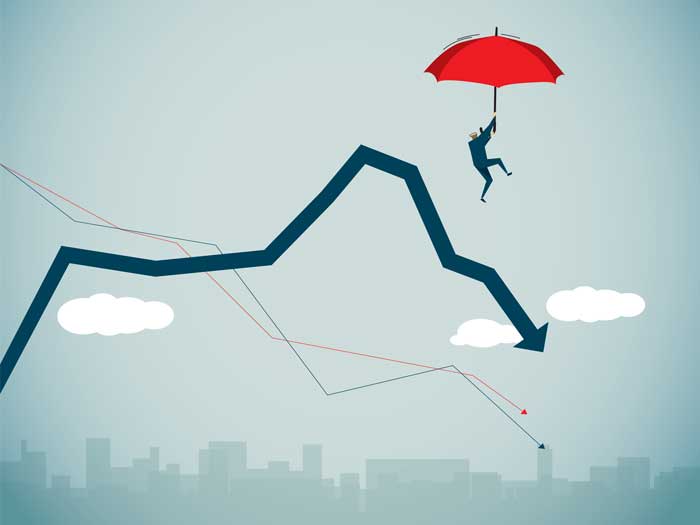
How do we deal with more frequent financial crises?
 For some, the recent months of volatility have brought the sobering recognition that preparing for the worst may be in order (Getty Images/Caroline Purser)
For some, the recent months of volatility have brought the sobering recognition that preparing for the worst may be in order (Getty Images/Caroline Purser)
The recent news that inflation is cooling, interest-rate hikes are easing and the slowdown in the economy could be more gradual than predicted has been welcome for Canadians who feared that a painful recession was on the horizon.
But the market roller coaster ride continues, and for those who have been bracing for a looming threat in the financial sector, these recent months of volatility have brought the sobering recognition that preparing for the worst may be in order. While some wonder if this economic hangover is as bad as forecasters warned, others feel we are not nearly out of the woods, given a confluence of crises that could bring us closer to a depression than a recession.
“I’ve been hearing talk of a global polycrisis,” says Frances Zomer, a CPA who is also founder and CFO of Pascal WealthTech, a company that is building an integrated wealth platform for financial advisers to manage their practices. “We've got war, we've got the aftermath of COVID-19, we've got inflation, we've got food shortages, we've got people losing their jobs, our hospitals are backed up, you name it.”
Amid this polycrisis, “people are under an enormous amount of stress,” she says, and they especially worry about the impact of world events on their livelihoods and long-term finances. “When in history have we had an environmental crisis, wars, and the loneliness factor at an all-time high? How do you even navigate that?"
Helping individuals and businesses weather a major financial downturn is an important role for CPAs, allowing them to focus on personal finance, saving and budgeting in turbulent times, now and in the future.
“I think the best thing that we can do is to caution people to be sensible,” says Warren MacKenzie, CPA and head of financial planning for Optimize Wealth Management. “Follow a disciplined process, take no more risk than necessary and be clear on your goals.”
He worries that the COVID-19 pandemic created new investors, stay-at-home dabblers who lack the advice and background to handle the ups and downs of the markets. This is adding a new layer of complex psychology to these tumultuous times.
"They're more inclined to herd mentality,” MacKenzie explains. “As soon as there's some really bad news—maybe the market drops by 15 per cent or the pundits turn negative—they'll follow the herd.”
Helping people cope with such volatile news is especially important given the barrage of it coming online, he notes. "You get more information every day, while 40 years ago there was no internet and people were not trying to live as quickly.”
Some experts suggest the actual structure of the economy could be fundamentally changing, making a return to a pre-pandemic “normal” more difficult. That’s what economist Mohamed El-Erian, chief economic adviser at Allianz, writes in an article in Foreign Affairs titled “Not Just Another Recession”. He notes that “to say that the last few years have been economically turbulent would be a colossal understatement,” from the surge in inflation and geopolitical tensions to supply-chain disruptions and rising interest rates. “Yet for the most part, economists and financial analysts have treated these developments as outgrowths of the normal business cycle.”
This tendency to see economic challenges “as both temporary and quickly reversible” is problematic, El-Erian argues. “Rather than one more turn of the economic wheel, the world may be experiencing major structural and secular changes that will outlast the current business cycle.” He expects even more uncertainty in the future as shocks grow more frequent and more violent. “In such a world, good decision-making is difficult and mistakes are easily made.”
People can end up running scared in volatile times, cautions Zomer, whose integrated-wealth platform for advisers includes behavioural finance elements, part of a questionnaire for clients to determine their risk tolerance. “You have to get to the behaviour that's behind it. Because when we're in a crisis, it's the subconscious that really comes through.”
People are affected in different ways by recent events and the current climate of uncertainty, she says. “Some are even in denial and running up credit-card debt…There's a sense that after being locked down for a couple of years, there's this freedom to be able to be out and enjoying life." On the other end of the spectrum, people can end up chasing losses and fretting about the market, she says. “Somebody pushes a button, and we're reacting in a way that's not rational.”
Helping businesses deal with uncertainty is also an important role for CPAs, Zomer notes. “Two keys to weathering the next crisis will be purpose and agility,” she says. “Businesses need to have a clear sense of purpose in order to assess the opportunities that will emerge.”
While some business leaders will focus on cuts, others will see opportunity, she comments. “Agile companies that have invested in digital strategies over the past several years will be positioned for growth.”
What’s most important for companies now is to “have a realistic outlook on what is happening in the economy,” she says. That is another instance where behavioural finance can make a difference. “By helping business leaders understand their biases, they will be better able to interpret the conflicting market data we’re seeing,” she notes. This can avoid the “confirmation bias” that comes from looking for data that is consistent with existing beliefs.
“I personally think it's going to be a stormy ride ahead,” adds Zomer. “But we don't want people panicking and worrying that it's the end of the world. Our capacity for innovation has never been greater. I see hope in our collective ability to meet the challenges of this decade.”
STAYING THE COURSE IN TURBULENT TIMES
Learn more about what a recession really is, and how to invest in a volatile market. Find out how to stay ahead of debt and bankruptcy, and check out CPA Canada's extensive financial literacy resources.